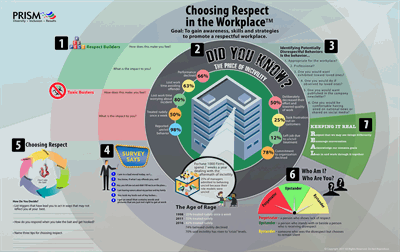 |
|

Choosing Respect in the Workplace™The lack of civility and respect are common occurrences among employees, managers, members of our government, professional sports athletes and international celebrities. Often, these behaviors are way over the line and have a far reaching negative impact. They are acted out in moments of emotions that leave us less than rational and far from portraying our “Best Selves”. In the workplace, all research indicates that employees report experiencing disrespectful behavior and managers at Fortune 1000 firms spend the equivalent of seven weeks a year dealing with the aftermath. And the bottom line: after polling 800 managers and employees in 17 industries, employees who said they had experienced disrespectful behavior, decreased their work effort, intentionally decreased the time spent at work, decreased the quality of their work, and reported that their commitment, performance, creativity and engagement declined…you get the picture! Disrespectful behavior in the workplace is expensive and prevents inclusion. Managing incidents is expensive. HR professionals report that one incident can soak up weeks of attention and effort. According to one study highlighted in Fortune, managers and executives at Fortune 1000 firms spend 13% of their work time - that's the equivalent of seven weeks a year - mending employee relationships and dealing with the aftermath of incivility and disrespectful behavioral incidents. And costs soar when attorneys are brought in, good employees and customers leave, recruitment and public relations costs escalate and the image and brand of the organization is tainted. As we all know, respect is the foundation and corner stone of Inclusion. Choosing Respectful Workplace Conversations Linda Stokes, President & CEO at PRISM International, Inc. discusses the story behind PRISM's new training program Choosing Respect in the Workplace™. Download her latest article, Choosing Respectful Workplace Conversations. Rudeness in the workplace isn't just unpleasant: it's also contagious. Encountering rude behavior at work makes people more likely to perceive rudeness in later interactions, a University of Florida study shows. That perception makes them more likely to be impolite in return, spreading rudeness like a virus. When you experience rudeness, it makes rudeness more noticeable. You'll see more rudeness even if it's not there. Part of the problem is that we are generally tolerant of these behaviors, but they're actually harmful. Rudeness has an incredibly powerful negative effect on the workplace. Now, take one uncivil or disrespectful incident, add one manager or executive and seven weeks of their time, throw in additional time and cost for dealing with the aftermath and multiply that by other incidents created by contagious rude behavior. Add up your total costs - be sure to include your opportunity cost. Expensive? Now, add in a second and a third uncivil or disrespectful incident on that same day or in another department or location. Now you really get the picture!
This is about more than learning to be polite…it's about knowing how to state your position or disagree without being disrespectful. It's about seeking common ground as a starting point for conversation and listening to other perspectives. It's also about avoiding the tendency to become hooked into unproductive behavior that ultimately results in personal and organizational loss. Choosing Respect in the Workplace™ facilitator-led is a 3-hour facilitator-led training program that is snappy, relevant, impactful, eye-opening and decision shaping – and bottom line enhancing for every level in your organization. We keep it real by using timely, relevant topics facing today’s workforce…the political scene, social trends, economic issues and all things impacting and influencing us in the 24-7 news cycle. Goal: To gain awareness, skills and strategies to promote a respectful workplace. At the conclusion of this workshop, you will achieve these objectives:
»» Request more information on Choosing Respect ««
|
The Cost of Incivility & Disrespect
Sources
Related Training
|
 PRISM believes in being proactive and promoting civil, respectful and inclsuive behaviors.
PRISM believes in being proactive and promoting civil, respectful and inclsuive behaviors.